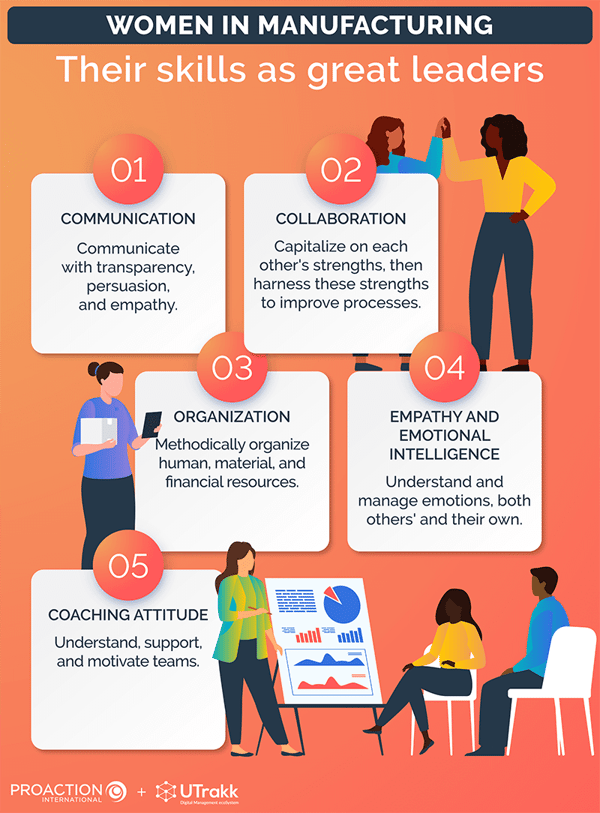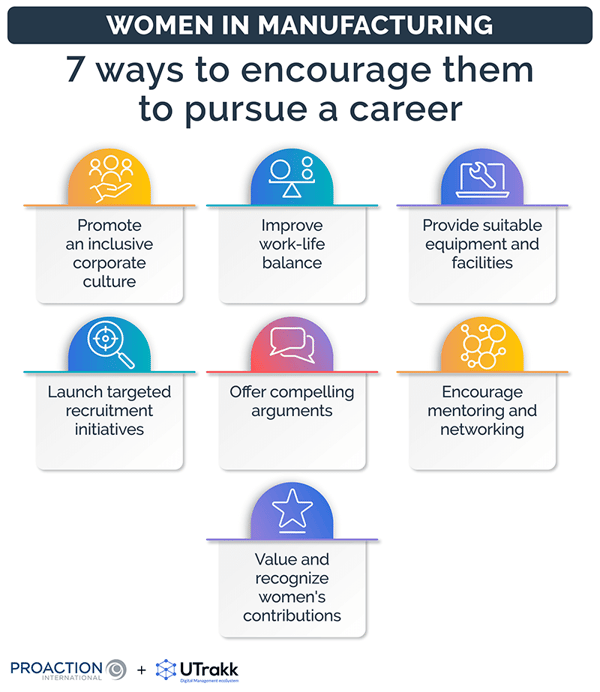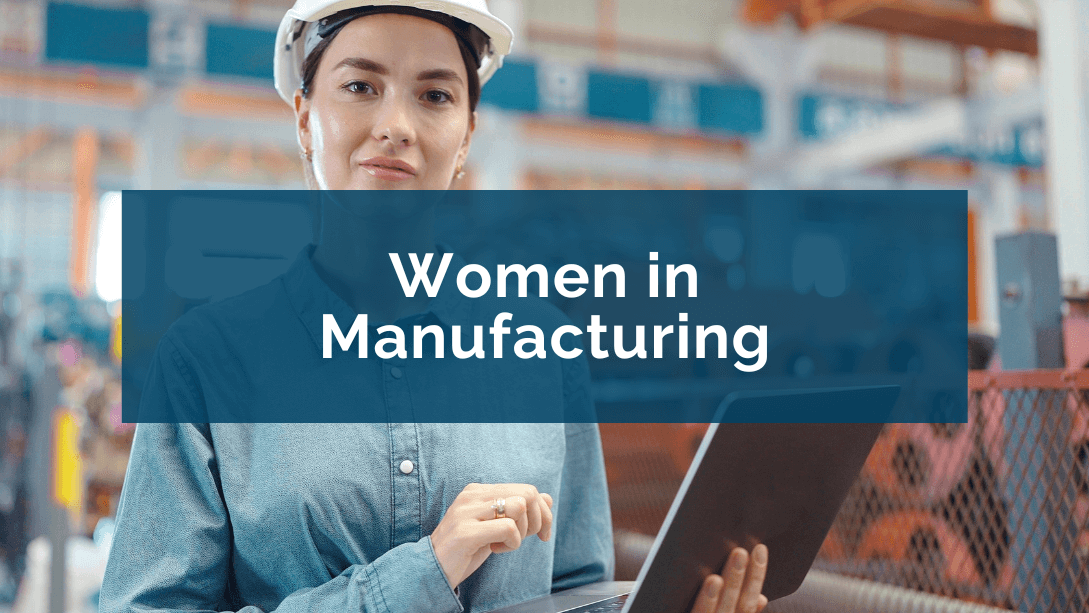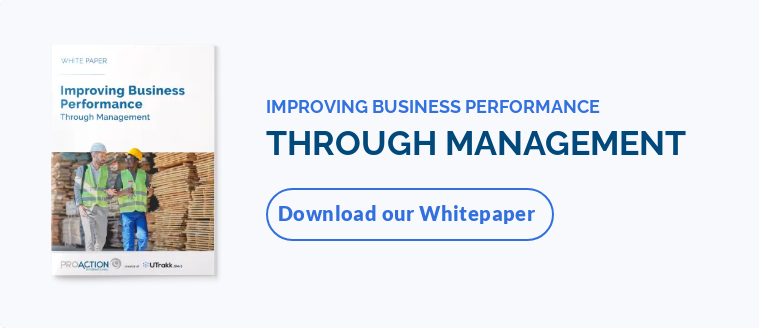The importance of a diverse workforce
Research shows that gender diversity benefits a manufacturing firm through improved ability to innovate, higher return on equity (ROE), and increased profitability. When employees believe their organization is committed to inclusion, they report better business performance in terms of their ability to innovate.
The importance of having a diverse workforce in manufacturing, and more broadly across all industries, is a topic increasingly highlighted in discussions of business performance and innovation. Teams made up of diverse individuals are more likely to be creative, to offer a wider range of perspectives, and to find innovative solutions to complex problems
If we focus primarily on gender, we realize that this kind of diversity has a positive impact on several key areas for the company:
Productivity
Studies show that mixed-gender teams often outperform others, for a number of reasons.
Firstly, gender diversity helps to create a more balanced and inclusive working environment, where every employee feels valued and engaged, which has a positive impact on efficiency and productivity.
Secondly, this wealth of people, and therefore of points of view, encourages better problem-solving and more informed decision-making, again contributing to higher productivity.
Innovation
Women and men may have different approaches to technical challenges, risk management, creativity and so on. So, having individuals of different genders allows us to benefit from many different perspectives. This creates a pool of ideas, opinions, expertise and experience that is highly conducive to innovation and the invention of original solutions.
Profitability
A study by McKinsey revealed that gender diversity in executive teams is strongly correlated with increased profitability and value creation.
Having a diverse workforce isn't just a matter of social justice; it's also a smart business strategy. A great deal of research has established a link between gender diversity, particularly in leadership roles, and better financial performance. Companies that harness the full potential of all their employees tend to be more competitive, resilient and profitable.
The skills that make women great leaders
Women portray the largest pool of untapped talent for manufacturing. The need for women isn't solely for numbers or to fill gaps – women consistently provide levels of creativity, empathy, organization, an eye for detail, and the capacity for leadership.
The increased presence of women in leadership and management roles can significantly transform the manufacturing sector. Female leadership styles, often characterized by a more collaborative, empathetic and inclusive approach, are particularly well suited to managing the challenges of Industry 5.0. Let's not forget that this evolution advocates a more humane way of working, more respectful of ethical and environmental aspects. So there's an obvious correlation between the two.
Let's take a closer look at these "natural" aptitudes often attributed to women, and their usefulness in terms of leadership:

Communication skills
Being able to communicate effectively is essential for clearly articulating an organization's vision and mission, aligning teams around common goals, facilitating dialogue between different departments and with external stakeholders, and effectively managing conflict.
Knowing how to communicate in a transparent, persuasive and caring way helps create a stimulating and healthy work environment, where information flows freely, fostering innovation and problem-solving.
Collaboration skills
Factory work is, above all, collaborative. Each team is made up of a number of employees tasked with working together to accomplish a task towards a specific goal.
Leaders who value and encourage collaboration can capitalize on everyone's strengths, then direct those same strengths to create new things and improve production processes.
The collaborative approach is particularly relevant in Industry 5.0, which demands cooperation not only between humans, but also with machines and intelligent systems.
Organization skills
A good leader needs to be well organized. This is even more true in a dynamic and demanding sector such as manufacturing.
Through various studies and observations, women have rightly demonstrated excellent organizational skills: effective project management, rigorous strategic planning, the ability to keep teams aligned on common objectives, and to adapt quickly, even in complex and/or changing environments.
This ability to methodically organize resources, whether human, material or financial, is a major asset in meeting the challenges of 5.0.
When women are among leaders in organizations, there is a wider lens of strategic thinking; groups/divisions can weather problems and issues better, and can identify innovative solutions faster.
Empathy and emotional intelligence
Understanding and managing emotions, both one's own and those of others, is crucial to motivating teams, better managing stress and building solid relationships. Empathy and emotional intelligence, often strong in women, are leadership skills that can make a big difference in a rapidly changing industrial environment.
Coaching skills
As a result of the qualities mentioned above, women often demonstrate a natural ability to adopt a coaching posture, i.e., to be both supportive and motivating. It is an essential skill when managing teams, particularly as a frontline manager. As a result, they often find it easier to understand and respond to their employees' needs while guiding them towards achieving common goals.
By integrating their "natural" coaching skills into front-line management, women can strengthen team cohesion, boost motivation and improve overall performance.
Typical challenges women face in manufacturing
According to a study conducted by the Manufacturing Institute, there are several significant challenges for women working in the manufacturing sector:
- Lack of flexibility (job sharing, split shifts, telecommuting): 63.10%
- Lack of childcare support: 49.20%
- Lack of female role models: 43.32%
- Minimal opportunities for advancement: 39.57%
- Insufficient compensation: 31.55%
Despite the obvious opportunities presented by women in leadership positions, the manufacturing sector is still a long way from achieving gender parity. Women pursuing a career in this field may encounter several obstacles linked to perceptions of the industry and more profound structural and cultural barriers.
These obstacles can hinder their entry, progression, and fulfillment in this traditionally male-dominated world.
Here are some of the main challenges women may face:
Gender stereotypes and unconscious biases
Persistent stereotypes about "appropriate" roles for men and women can discourage women from pursuing careers in manufacturing. For example, the idea that men are naturally more suited to physical or technical tasks, while women would be better suited to administrative or support roles.
In addition, unconscious biases can influence hiring, promotion, and appraisal decisions, limiting opportunities for women to progress in their careers. It can include, for example, giving preference to male candidates for critical roles or promotions because they "fit in better" with the team or job expectations.
Lack of female role models
The absence of women in leadership or technical roles within the manufacturing sector can make it difficult for newcomers to imagine a successful career in this field.
Lack of flexibility
The demanding work schedules and night shifts standard in the manufacturing sector can be particularly problematic for women, especially those with family responsibilities. The difficulty of balancing professional and personal demands can discourage some from remaining in this sector.
Corporate culture and harassment
A corporate culture that fosters macho behavior or fails to take harassment complaints seriously creates a hostile working environment for women. Not only can this affect their well-being, but it can also undermine their motivation and drive them to change fields.
The pay gap
In many other sectors, there is a pay gap between men and women in some manufacturing companies. Why, then, should women continue to work for an organization that doesn't pay them what they're worth, or at least in the same way as their male counterparts?
7 Ways to encourage women to make a career in manufacturing
To overcome the above barriers and inspire women to pursue careers in manufacturing, organizations need to take proactive steps to create more inclusive and equitable work environments.
Here are 7 recommended approaches to achieve this:

1. Promote an inclusive corporate culture
Awareness-raising and training: Implement training programs for all employees, including management, on the importance of diversity, equity, and inclusion (DEI), as well as how to recognize and combat unconscious bias.
Anti-harassment and anti-discrimination policies: Establish zero-tolerance policies towards harassment and discrimination, with clear, accessible, and confidential avenues of redress for victims.
Diversity objectives: Set clear objectives for diversity and inclusion, then integrate them into company strategies, with performance indicators to measure progress.
Accountability and transparency: Communicate openly about progress on diversity and inclusion objectives, then incorporate these objectives into managers' performance appraisals.
2. Improve work-life balance
Flexible schedules: Offer flexible work options, such as telecommuting, flextime, or flexible shifts, to help all employees better manage their personal and professional obligations.
Parental and care leave: Offer generous parental and care leave for mothers and fathers. It will also encourage shared responsibility for care within the home.
3. Provide suitable equipment and facilities
Adapted personal protective equipment (PPE): Ensure that protective equipment is available in sizes and designs suitable for women's safety and comfort.
Improve facilities: Investing in sanitary facilities and changing rooms that are safe and comfortable for women can be a good idea.
4. Launch targeted recruitment initiatives
Inclusive recruitment: Use recruitment practices aimed at reaching a wide range of female candidates, making sure to use inclusive language in job advertisements and diversifying recruitment channels.
5. Offer compelling arguments
Competitive compensation: Ensure that salaries, benefits, and other forms of compensation in your company are not only aligned with market standards but also gender equitable.
Stimulating and rewarding positions: Create work opportunities that interest and challenge women and enable them to use their skills, innovate, and grow professionally fully.
6. Encourage mentoring and networking
Mentoring programs: Offer mentoring programs to support women at different stages of their manufacturing careers, pairing them with experienced mentors, with female rather than male figures, where possible.
Networking groups: Encourage the formation of professional networks for women, offering opportunities for connection, experience sharing, and mutual support.
7. Value and recognize women's contributions
Visibility and recognition: Highlight the achievements of women in the company through awards, internal and external communications profiles, and industry events to reinforce female role models.
Empowering women in manufacturing for a successful future
Many outstanding women leaders are making huge strides in building and promoting the manufacturing industry and are demonstrating what modern manufacturing offers – rewarding and fulfilling careers with limitless opportunity for growth. Today’s manufacturing employees are building and designing the future, and women in manufacturing serve as ambassadors to move this industry forward.
Jay Timmons President and CEO, National Association of Manufacturers, in Deloitte
For manufacturing to thrive in the Industry 5.0 era and beyond, we need to break down the barriers that prevent women from fully participating. It means challenging gender stereotypes, providing equal opportunities for professional and leadership development, and valuing the unique skills and perspectives that women bring to the table. By making gender equality a strategic priority, organizations in this field can become more inclusive, innovative, resilient, and competitive.
Let's face it: the future of manufacturing lies in our collective ability to embrace and value diversity in all its forms. Empowering women to contribute fully to this sector isn't just a matter of equality or conforming to societal expectations; it's a crucial step towards building a more dynamic, sustainable and open industry, capable of meeting the challenges and seizing the opportunities of Industry 5.0.
By investing in women's potential, the manufacturing sector can prepare its own future and contribute to a more equitable and prosperous world for all. That's why it's essential to start making the right moves and taking action now.










